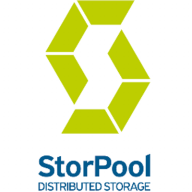


Scality RING and StorPool are competing products in the cloud storage and management space. StorPool is seen as superior owing to its robust feature set, which many find justifies its higher price point.
Features: Scality RING offers a distributed file system, native AWS S3 compatibility, and scalable architecture. StorPool provides high performance, low latency, and seamless integration with existing systems.
Room for Improvement: Scality RING may benefit from enhancements in its performance metrics and feature set to match the demands of enterprise-grade needs. Customization options might be more advanced, and faster integration with new systems could improve utility. StorPool could refine its complex deployment process to be more user-friendly, provide broader support for various environments, and optimize initial setup times.
Ease of Deployment and Customer Service: Scality RING is recognized for a straightforward deployment model and attentive customer support, which simplifies onboarding. StorPool’s deployment offers extensive customization options though slightly complex, tailored for specific needs.
Pricing and ROI: Scality RING presents a flexible setup cost and competitive pricing schemes, yielding strong ROI. StorPool, despite a higher upfront cost, offers long-term cost benefits due to its high performance.
It does not require much management once you set up correctly, so it saves time, allowing an admin to focus on other work.
I think RING's ability to maintain predictable costs while providing scalable storage solutions impacts our budget by allowing us to pay only for capacity.
For instance, while the cost per gig on a block storage platform may be $2, it's $1.50 for NAS, and only $0.50 for object storage, leading to a remarkable 75% reduction in costs by utilizing the Scality platform.
Scality RING has reduced our operating costs.
I would rate them an eight out of ten.
The support is done through email and is not that great, making it a very problematic area I've been dealing with for over four years.
Their technical support has been perfect lately, so I would give it a 10.
I've always received responses within the required timeframe, the answers were technically relevant, and there was follow-up—people called us back to check if everything was okay and if the ticket could be closed.
Individuals such as Peter Mikolastik really make a difference by saying, 'Come on, what is the problem? I will help you,' rather than just brushing things off.
Technically, when we have major issues in P1, they are very responsive and we can't say that we don't get a response.
Pure Storage FlashBlade is scalable.
There are between 5 and 10,000 people using it in our organization.
Upwards, I think, almost unlimited by what we can imagine.
I've never had issues with scalability.
We are relatively well informed about their new features, what will be implemented in future versions, and the scalability of the solution.
In case there is any issue with any blade, the data is moved to another.
It is a platform that is very stable at the customer level and does not generate incidents or blockages that you might encounter with standard storage solutions, where you can lose data.
I find that Scality RING is very stable because it allows for many maintenance operations without service loss.
There are factors that can cause Scality RING to become occasionally unavailable, but due to the system's resilience, it is capable of recovering or degrading gracefully.
Technical support definitely needs significant improvement.
Its configuration should be easier.
One way Pure Storage FlashBlade can be improved is by having more compatibility between the FlashArray and FlashBlade.
Encryption and data security need improvement. We don't have a solution for customers who need confidentiality.
They should prioritize quality over timeliness to minimize customer disruptions and not force customers into a cycle of fixes that interfere with daily work.
What we are currently missing and will be demanding in the new tender is an additional external backup of all data, ideally on a simple system, to safeguard against any severe local incidents so that we still have the data protected elsewhere.
The pricing of Pure Storage FlashBlade is expensive compared to other products I used from other companies in the past, but one benefit is that they have built-in ransomware protection.
Regarding pricing, it is okay; we needed exactly this in size, and the price was a lot lower than competitors, making it good for us.
Fortunately, in terms of the license, we are able to expand the disks without having to adjust the license.
In the end, it always depends on how much you pay for it.
Regarding setup costs and licensing, our initial experience is somewhat dated now as we made a comprehensive purchase, including hardware, software, and system setup, which Scality handled at the time.
We can plug in many blades, and we can have data up to one terabyte.
The best features of Pure Storage FlashBlade include better throughput and better performance.
Pure Storage FlashBlade's scalability is one of the most valuable features, and importantly, it always works, allowing for seamless upgrades.
When a server is lost, the data is still accessible.
It is even better stored when there is only one copy on a system and there is a second copy on an immutability system, which is almost equivalent to backing it up on tape and taking it offline, making it completely inaccessible.
Scality RING has influenced our approach to scaling in different dimensions by providing a cost-effective solution for the tremendous amount of data we generate every day for each customer.
| Product | Market Share (%) |
|---|---|
| Scality RING | 4.0% |
| Pure Storage FlashBlade | 3.3% |
| StorPool | 2.9% |
| Other | 89.8% |


| Company Size | Count |
|---|---|
| Small Business | 11 |
| Midsize Enterprise | 11 |
| Large Enterprise | 21 |
| Company Size | Count |
|---|---|
| Small Business | 3 |
| Midsize Enterprise | 1 |
| Large Enterprise | 12 |
| Company Size | Count |
|---|---|
| Small Business | 6 |
| Large Enterprise | 1 |
FlashBlade is the industry’s most advanced scale-out storage for unstructured data, powered by a modern, massively parallel architecture to consolidate complex data silos (like backup appliances and data lakes) and accelerate tomorrow’s discoveries and insights.
Scality RING is the scalable and resilient object storage solution designed for modern workloads, providing seamless data protection against evolving cyber threats.
Scality RING leverages S3 object storage to meet unpredictable demands with a patented MultiScale Architecture that offers limitless scalability across capacity, performance, and more. It delivers end-to-end cyber resilience with CORE5 for ransomware protection, while its cloud-style economics and intuitive management empower enterprises to accelerate AI initiatives and optimize cloud deployments. Its flexibility is ideal for service providers managing extensive data needs.
What are the key features of Scality RING?Scality RING is extensively implemented in backup solutions across industries, supporting platforms like Veeam and CommVault. It aids in storage expansion and management of large data volumes alongside multi-site architectures. While not leading in AI spaces due to performance constraints, there's potential with faster disk support. It's also used in archives, binary lakes, multimedia services, and AI data lakes.
StorPool is intelligent storage software that runs on standard servers and builds scalable, high-performance storage system out of these servers (software-defined storage). It focuses on the block-level storage and excels at it. It is incredibly flexible and can be deployed in both converged setups (on compute nodes, alongside VMs and applications) or on separate storage nodes.
StorPool has advanced fully-distributed architecture and is arguably the fastest and most efficient block-storage software on the market today. It is the best storage system when building a cloud.
We monitor all Software Defined Storage (SDS) reviews to prevent fraudulent reviews and keep review quality high. We do not post reviews by company employees or direct competitors. We validate each review for authenticity via cross-reference with LinkedIn, and personal follow-up with the reviewer when necessary.